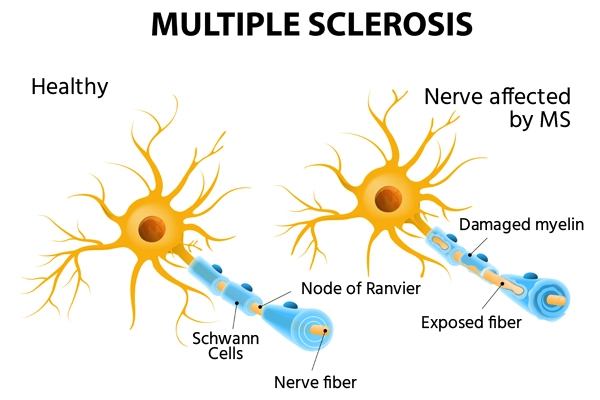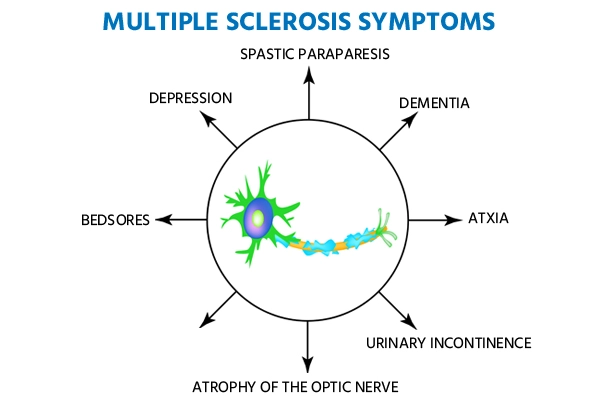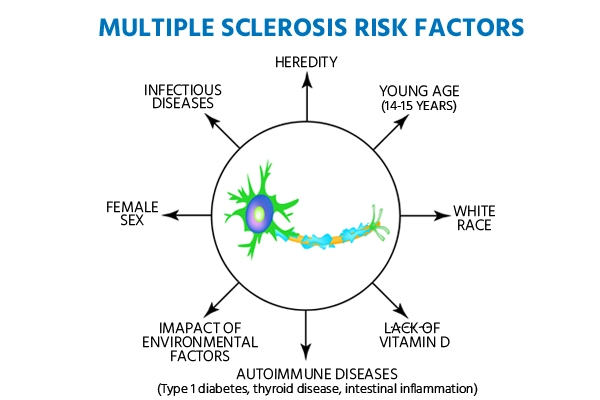What is Multiple Sclerosis?
Multiple sclerosis (MS) is a chronic condition involving the central nervous system (CNS). It is also known as disseminated encephalomyelitis, a demyelinating illness that damages the insulating linings of the immune system and attacks myelin, the protective layer around nerve fibres. This condition interferes with the capacity of sections of the nervous system to transfer messages, resulting in various indications and symptoms, including physical, mental, and, in some cases, psychiatric issues. Specific symptoms may include double vision, blindness in one eye, muscular weakness, and sensory or coordination issues.
Secure your health with a second opinion. Make informed decisions and book your appointment today!
Get A Second Opinion
Types of Multiple Sclerosis
There are four types of multiple sclerosis:
- Clinically isolated syndrome (CIS)
- Relapsing-remitting MS (RRMS)
- Primary progressive MS (PPMS)
- Secondary progressive MS (SPMS)
Symptoms of Multiple Sclerosis
People with MS experience a wide range of symptoms. Due to the nature of the disease, symptoms can vary widely from person to person. They can also change in severity yearly, month to month, and day to day. Here are some of the most common symptoms associated with MS.
- Muscle weakness
- Numbness, and tingling
- Lhermitte’s sign
- Bladder problems
- Bowel problems
- Fatigue
- Dizziness and vertigo
- Sexual dysfunction
- Spasticity, and muscle spasms
- Tremor
- Vision problems
- Gait and mobility change
- Emotional changes and depression
- Learning and memory problems
- Pain
When to see a doctor?
If a doctor says you have multiple sclerosis, consider seeing an MS specialist, or neurologist, for a second opinion. People should consider the diagnosis of MS if they have one or more of these symptoms:
- Vision loss in one or both eyes
- Acute paralysis in the legs or along one side of the body
- Acute numbness and tingling in a limb
- Imbalance
- Double vision
Confirming the diagnosis is an important step for a disease that depends on a strong long-term relationship between a patient, family members and a medical team to monitor and manage the disease.
Get the best treatment for Multiple Sclerosis from our Neurologists at Medicover Hospitals.
Causes
Doctors don’t know what causes MS, but many things seem to make the disease more likely. People with certain genes may have higher chances of getting it. Smoking also may raise the risk. Some people may get MS after they’ve had a viral infection like the Epstein-Barr virus or the human herpesvirus six that makes their immune system stop working normally. The infection may trigger the disease or cause relapses. Scientists are studying the link between viruses and MS, but they don’t have a clear answer. Some studies suggest that vitamin D, which you can get from sunlight, may strengthen your immune system and protect you from MS. People with higher chances of getting the disease who move to sunnier regions seem to lower their risk.
Risk Factors
These factors may increase your risk of developing multiple sclerosis:
Age
MS can occur at any age, but onset usually occurs around 20 and 40. However, younger and older people can be affected.
Sex
Women are more than two to three times as likely as men to have relapsing-remitting MS.
Family history
If one of your parents or siblings has had MS, you are at higher risk of developing the disease.
Certain infections
Various viruses have been linked to MS, including Epstein-Barr, which causes infectious mononucleosis.
Ethnicity
MS is most common among white people of northern European ancestry.
Climate
MS is far more common in countries with temperate climates, including Canada, the northern United States, New Zealand, southeastern Australia and Europe.
Vitamin D
Low vitamin D levels and low sunlight exposure are associated with a greater risk of MS.
Genes
Although doctors do not know the inheritance pattern of MS, a person may have a higher chance of developing it if they are related to someone who has it.
Certain autoimmune diseases
You have a slightly higher risk of developing MS if you have other autoimmune disorders such as thyroid disease, pernicious anaemia, psoriasis, type 1 diabetes or inflammatory bowel disease.
Smoking
Smokers who experience an initial event of symptoms that may signal MS are more likely than nonsmokers to develop a second event that confirms relapsing-remitting MS.
Complications
If MS progresses, worsening symptoms may lead to complications such as
- Difficulty walking that may result in needing a cane, walker or wheelchair.
- Loss of bowel or bladder control.
- Memory problems.
- Sexual difficulties.
Prevention
Scientists, researchers, and doctors haven’t yet been able to develop a method of curing or preventing MS. One of the main reasons is that MS's cause isn’t fully understood. Experts believe a combination of genetic and environmental factors contributes to the development of MS. Identifying these factors might one day help pinpoint the cause of the disease. This can open the door to developing treatments and prevention options.
Diagnosis
A neurologist will need to perform a neurological exam. They will also talk with you about your clinical history and order a series of other tests to determine if you have MS. Diagnostic testing may include the following:
-
MRI scan : Using a contrast dye with the MRI allows your doctor to detect active and inactive lesions throughout your brain and spinal cord.
-
Optical coherence tomography (OCT) : In this test, a picture is taken off the nerve layers in the back of your eye to check for thinning around the optic nerve.
-
Spinal tap (lumbar puncture) : Your doctor may order a spinal tap to find abnormalities in your spinal fluid. This test can help rule out infectious diseases. It can also be used to look for oligoclonal bands (OCBs), which can diagnose MS.
-
Blood tests : Doctors order blood tests to help eliminate the possibility of other conditions that have similar symptoms.
-
Visual evoked potentials (VEP) test : This test requires the stimulation of nerve pathways to analyse electrical activity in your brain. In the past, brain stem auditory-evoked and sensory-evoked potential tests were also used to diagnose MS.
Treatment
There is currently no cure for MS. Treatment focuses on managing symptoms, reducing relapses (periods when symptoms worsen) and slowing the disease’s progression. Your comprehensive treatment plan may include
-
Disease-modifying therapies (DMTs) : Several medications have FDA approval for long-term MS treatment. These drugs help reduce relapses (also called flare-ups or attacks). They slow down the disease’s progression. And they can prevent new lesions from forming on the brain and spinal cord.
-
Relapse management medications) : If you have a severe attack, your neurologist may recommend a high dose of corticosteroids. The medication can quickly reduce inflammation. They slow damage to the myelin sheath surrounding your nerve cells.
-
Physical rehabilitation : Multiple sclerosis can affect your physical function. Staying physically fit and strong will help you maintain your mobility.
-
Mental health counselling : Coping with a chronic condition can be emotionally challenging. And MS can sometimes affect your mood and memory. Working with a neuropsychologist or getting other emotional support is essential to managing the disease.
Lifestyle Changes and Selfcare
Lifestyle changes can help ease symptoms. It can also put off flare-ups and keep symptoms from getting worse. A person's coping skills and outlook can also help manage MS. Some habits that may help are:
- Working out can help with muscle strength, balance, and fatigue.
- Swimming is a good choice. The water helps keep the body cool when swimming.
- Eat a diet low in bad fats and rich in whole grains, fruits, and veggies. The fibre in grains, fruits, and veggies helps stop constipation.
- Vitamin D levels can be checked in the blood. Supplements may need to be taken if levels are low.
- Drink plenty of water. Avoid drinks that cause dehydration, like drinks with caffeine.
- Many people with MS notice that stress makes their health problems worse. Think about getting massages and doing other things that lower stress, such as meditation, yoga, and deep breathing.
- Smoking may worsen MS. People who smoke should talk to their doctor about choices for quitting. There are classes, online self-help programs, nicotine replacement products, medicines, and many other options.
- Take plenty of rest as it helps ease fatigue.
Ready to take control of your health journey? Book your appointment now and start your path towards wellness today!
Book an Appointment
Do’s And Don’ts With Multiple Sclerosis
Living with multiple sclerosis is a challenge and it requires a set of dos and don’ts to be followed. Take care of yourself, stay informed and seek medical care on time to further manage this condition.
Awareness and self-care will help you fight the condition positively and improve your quality of life.
Multiple Sclerosis Care at Medicover
At Medicover, we have the best team of Neurologists and Neurosurgeons who work together to provide Multiple Sclerosis treatment with utmost precision. Our highly skilled team utilises the latest medical equipment, diagnostic procedures and technologies to treat various neurological diseases and ailments. For Multiple Sclerosis, we adopt a multi-disciplinary approach to provide comprehensive care to the patients and attend to all their medical needs at once for faster and sustained recovery.
Citations
Multiple sclerosis



